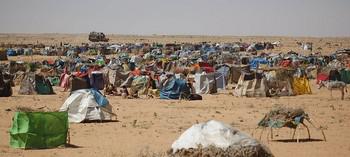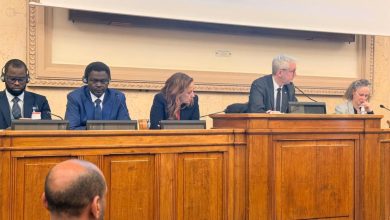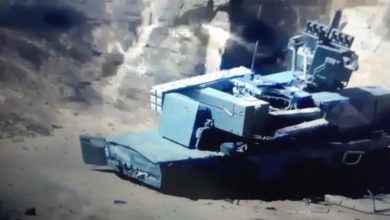Voices Under Siege.. Kalma Camp – South Darfur, and Arkaweet – Khartoum,

Sudan Events – Agencies
Kalma Camp – South Darfur, September 25, 2024
I am currently in Kalma Camp, and as it’s well known, the camp lacks services. CARE was responsible for electricity and water, but since the war started, the organization left Sudan, and the aid they provided has stopped. Now, people bring water from distant wells, transport it in water tanks, and sell it in the camp. Currently, a jug of water costs 200 pounds, and a full water tank costs 6,000 pounds.
Our supplies come from outside Sudan, and all the markets here or in the city of Nyala rely on goods coming from South Sudan. Before the war, we used to get goods from Libya through Al Malha, El Fasher, Labdo, and Beleil, and from there, they would reach us. But that road is now closed. Due to heavy rains, vehicles have come to a complete stop, and this has prevented goods from moving. Because of these shortages, I can only describe the price increase as a 7,200% rise. For example, six months ago, a pound of sugar cost 1,000 pounds; now, it costs 2,500 pounds. Rice was 2,000 pounds; now, it’s 5,000. A 25kg bag of flour used to be 30,000 pounds, but now it’s between 95,000 and 100,000 pounds. A measure of millet or sorghum that used to cost 5,000 pounds now costs 12,000.
The war that started on April 15 disrupted roads and affected the companies that used to sell and import supplies, along with the challenges brought by the rainy season. As a result, prices skyrocketed, leaving everyone confused. Currently, most families have stopped cooking asida, a staple meal in every home, because it has become too expensive. People now survive on pasta and vermicelli, eating just once a day. Some can’t even afford that and rely on “kreeb,” a type of porridge made from wild grasses that grow during the rainy season. Food scarcity is severe and is directly reflected in widespread malnutrition, especially among children.
Inside the camp, movement is normal, and there’s no government intervention or restrictions. Even before the recent war, there was coordination with the government and forces, allowing a margin of freedom in movement and work within the camp. But outside the camp, everything is chaotic. Families are trapped between the railway to the far south of the camp and the valley to the far north. People are living within these two boundaries, and if you leave, you risk being killed, physically harmed, or robbed. Women face the threat of rape, and men are often kidnapped and held for ransom. This has happened to many who left the camp to get supplies or search for work. These violations are carried out by the Rapid Support Forces, who control all of South Darfur.
Within the camp, people get around using carts. The nearest local transport is rickshaws and tuk-tuks, which can take you from the camp to Beleil for 1,000 pounds. Before the war, buses used to run from the camp to Nyala for 1,000 pounds, but now there are no buses due to the war, and tuk-tuks charge 3,500 pounds.
Regarding healthcare, there are two medical centers. One is run by Doctors Without Borders, which is currently providing services. There was another center, MIC, but due to the lack of safe routes and logistical issues, they left the camp, and Doctors Without Borders has taken over.
The security situation inside the camp is calm, but outside, there is looting and violence. The looters rely on robbing people, especially after the aerial bombardment in Nyala, which has led them to spread through the streets, violently attacking people and breaking into homes to take anything they want by force. Since they control the entire state, they can do anything, and no one will rescue you. They are divided into an official Rapid Support Force group, wearing uniforms, and others who are just outlaws roaming the streets, robbing and beating people. Because of these harassments, no one dares to leave the camp. They treat the camp as if it’s a base for army soldiers after the fall of the 16th Infantry Division, accusing anyone inside of being part of the military. They can accuse you of anything to provoke you and then arrest you. Afterward, they demand a ransom, which is often an exorbitant amount.
Recently, the Rapid Support Forces created something called the Civil Authority, acting as the de facto rulers of the region. The head of this authority has powers similar to a governor, with executive authority. According to their claims, this was established to ensure the success of the agricultural season, and they are responsible for protecting farming areas.
Arkaweet – Khartoum, September 26, 2024
Since the war began, I have been in Arkaweet, Block 46, which is my family’s home where I grew up. Due to the war, the rest of my family traveled to Egypt and other states like Port Sudan and Kassala, but I stayed behind to guard the house until things calm down. Now, I am completely trapped, and leaving Khartoum after a year and a half of war is difficult. It’s better to die in your own home than be detained or suffer in other states. But, of course, each person makes their own decisions based on their situation.
Throughout this time, without any work, I have been volunteering at a local health center called Omar bin Al-Khattab, part of an initiative called “Kulna Afiya” (We Are All Well). The initiative includes several central kitchens and the neighborhood’s health center. The center was operational during the COVID-19 pandemic, where cases were monitored, and tests were conducted for patients.
Since the start of the war, the center completely shut down, and part of the staff left. But after a month, residents of the area decided to reopen it and use it for the benefit of the remaining locals. The youth from the resistance committees and other volunteers, many of whom had no medical background, took the initiative to run and manage the center. They coordinated its operations and sought out any doctors they could find nearby.
The center is located in Arkaweet 46 and serves residents of the “forties” blocks, covering neighborhoods 40-49, a total of nine areas. The center is right in the middle of this region. Through their network of contacts and coordination between neighborhoods, the volunteers managed to bring in doctors, also volunteering. One specialist was working until recently, and a general practitioner is currently working every day. Laboratory staff are also volunteering without pay. The center has equipment like X-rays and a fully functioning lab, as well as dental check-up devices. However, the main issue is operational capacity, and the demand far exceeds the center’s ability to meet the needs.
For example, X-ray machines require files to operate, and other lab materials are running out, with no way to replenish them. People even approach the militias directly to ask for fuel and medicines, as they have stored supplies in their hospitals.
As for medications, the only way is to deal with the militias, unfortunately. Some treatments come through the Khartoum Emergency Room, which is responsible for distribution. Another way we obtain medicines is from closed pharmacies, where owners have given up on moving their supplies out of Khartoum. They donate these medicines to the initiatives and groups working with the residents. Even some members of the militias come to us for treatment, and to improve their image, they ask us what we need. Sometimes, they bring fuel, and other times, we provide them with a list of needed medications, which they can supply from the large stocks they have looted.
However, we are in desperate need of medications, and the situation is tough. People cannot afford to buy medicine; they can barely feed their children.
Priority is given to treating locals so that they don’t have to go to militia hospitals or travel long distances just for a check-up. We also have a section for cleaning wounds and treating injuries, as many people come in with shrapnel or bullet wounds. Militias involved in their battles also come to us for treatment, and we cannot refuse them. After all, they come with weapons and in combat vehicles, so for everyone’s safety, we treat them without objection. Our focus is on saving civilians and ensuring our own survival. Everyone is trying to get through this with minimal losses, even though we’ve lost almost everything because of the war.



